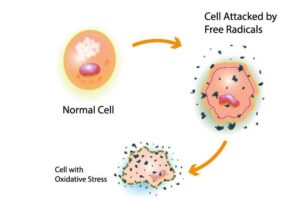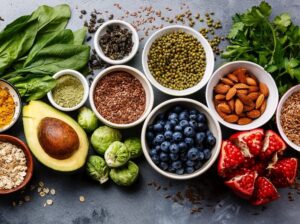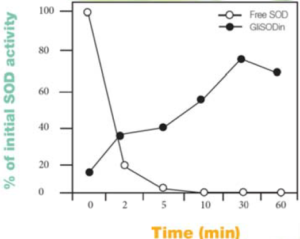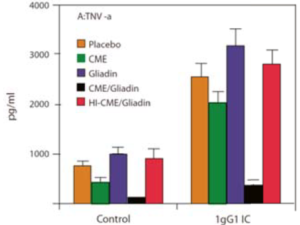
Oxidative stress is a phenomenon caused by an imbalance between production and accumulation of oxygen reactive species (ROS) in cells and tissues and the ability of a biological system to detoxify these reactive products. Long-term oxidative stress damages the body’s cells, proteins, and DNA. This can contribute to aging and may play an important role in the development of a range of conditions.

Antioxidants play an important role in the body. However, naturally occurring antioxidants can only play a buffering role, because they are rapidly saturated. The strongest and first front line of the body’s antioxidant remain the enzymes like Superoxide dismutase (SOD), along with catalase and glutathione peroxidase. The enzymes are biological catalysts and they reduce ROS without being consumed themselves. But the production of SOD decreases with age, like most other protective mechanisms in the body… putting the cells under increasing oxidative stress.
Moreover, oral administration of SOD present in many plant extracts is usually not effective, because the enzymes are deactivated through the gastrointestinal pathway. Therefore, usual studies based on free SOD cannot prove the efficacy, or at an incredibly high use. But technology helps: combining SOD with a wheat gliadin biopolymer system temporarily protects the SOD during its passage.

GliSODin®, the combination of SOD extracted from cantaloupe melon (Cucumis melo L.C.) with the wheat gliadin biopolymer. While the enzymatic activity of oral free SOD in the body is mainly to destroyed within few minutes and can so not promote the production of the SOD cascade by the cells, GliSODin® improves the delayed release of SOD, as evidenced in vitro by the increase of its activity in a medium mimicking the digestive conditions.
% Of Initial SOD Activity

GliSODin® showed impressive results also in suppressing inflammation as evidenced in an in vivo study, where GliSODin® reduced the production of the pro-inflammatory cytokine, tumor necrosis factor-alpha (TNF-α) and promoted production of the anti-inflammatory cytokine interleukin-10 (IL-10) compared to the other treatments. The anti-inflammatory effects of GliSODin® are significant since chronic inflammation is associated with the onset and progression of many chronic diseases.
